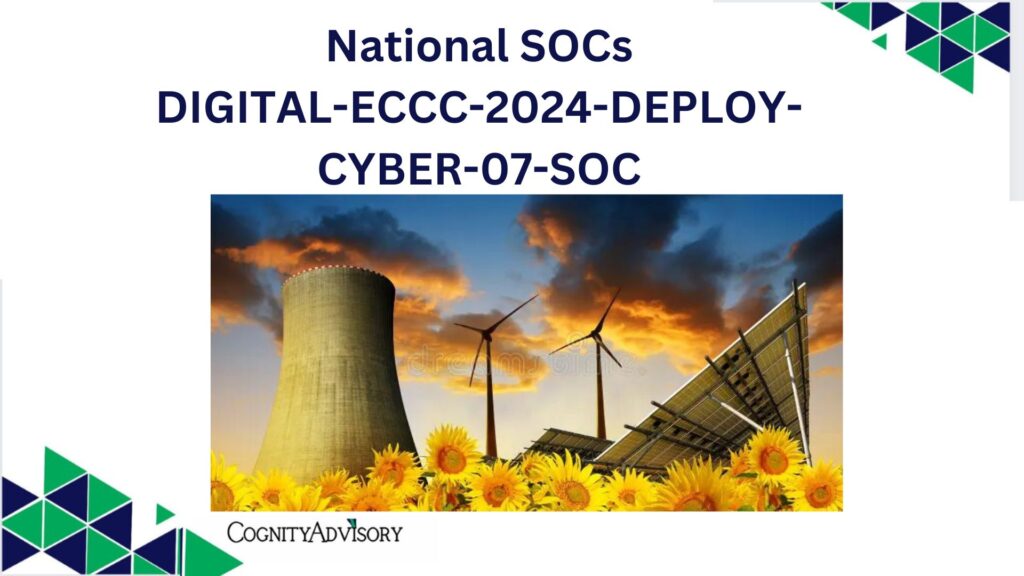DIGITAL-ECCC-2024-DEPLOY-CYBER-07-SOC
General information
Programme
Digital Europe Programme (DIGITAL)Budget overview
Call
Deployment actions in the area of cybersecurity (DIGITAL-ECCC-2024-DEPLOY-CYBER-07)
Type of action
DIGITAL-JU-SIMPLE DIGITAL JU Simple Grants
Type of MGA
DIGITAL Action Grant Budget-Based [DIGITAL-AG]
Forthcoming
Deadline model
single-stage
Planned opening date
04 July 2024
Deadline date
21 January 2025 17:00:00 Brussels timeTopic description
ExpectedOutcome:
- World-class National SOCs across the Union, strengthened with state-of-the-art technology, acting as clearinghouses for detecting, gathering and storing data on cybersecurity threats, analysing this data, and sharing and reporting CTI, reviews and analyses.
- Threat intelligence and situational awareness capabilities and capacity building supporting strengthened collaboration between cybersecurity actors, including private and public actors.
Objective:
The objective is to create or strengthen National SOCs, in particular with state-of-the-art tools for monitoring, understanding and proactively managing cyber events, in close collaboration with relevant entities such as CSIRTs. They will also, where possible, benefit from information and feeds from other SOCs in their countries and use the aggregated data and analysis to deliver early warnings to targeted critical infrastructures on a need-to-know basis.Scope:
The aim is capacity building for new or existing National SOCs, e.g., equipment, tools, data feeds, as well as costs related to data analysis, interconnection with Cross-Border SOC platforms, etc. This can include for example automation, analysis and correlation tools and data feeds covering Cyber Threat Intelligence (CTI) at various levels ranging from field data to Security Information and Event Management (SIEM) data to higher level CTI. National SOCs should also leverage state of the art technology such as artificial intelligence and dynamic learning of the threat landscape and context. This also includes the use of shared cybersecurity information, to the extent possible based on existing taxonomies and/or ontologies, and hardware to ensure the secure exchange and storage of information. The operations should be built upon live network data. Where relevant, consideration should be given to SMEs as the ultimate recipients of cybersecurity operational information.
A key element is the translation of advanced AI/ML, data analytics and other relevant cybersecurity tools from research results to operational tools, and further testing and validating them in real conditions in combination with access to supercomputing facilities (e.g., to boost the correlation and detection features of cross-border platforms).
Another key role for National SOCs is knowledge transfer, such as training of cybersecurity analysts. For example, SOCs dealing with critical infrastructures play a key role and should benefit from the knowledge and experience acquired by or concentrated in National SOCs.
National SOCs must share information with other stakeholders in a mutually beneficial exchange of information and commit to apply to participate in a cross-border SOC platform within the next 2 years, with a view to exchanging information with other National SOCs.
To achieve this aim, a call for expression of interest will be launched to select entities in Member States that provide the necessary facilities to host and operate National SOCs. Applicants to the call for expressions of interest should describe the aims and objectives of the National SOC, describe its role and how such role relates to other cybersecurity actors, and its eventual cooperation with other public or private cybersecurity stakeholders. Applicants should also provide the detailed planning of the activities and tasks of the National SOC, the services it will offer, the way they will operate and be operationalised, and describe the duration of the activity as well as the main milestones and deliverables. They should also specify what equipment, tools and services need to be procured and integrated to build up the National SOC, its services and its infrastructure.
To support the above activities of a National SOC, the following two workstreams of activities are foreseen:
- [Procurement] A Joint Procurement Action with the Member State where the national SOC is located: this will cover the procurement of the main equipment, tools and services needed to build up the National SOC
- [Building up and running the National SOC] A grant will also be available to cover, among others, the preparatory activities for setting up the National SOC, its interaction and cooperation with other stakeholders, as well as the running/operating costs involved, enabling the effective operation of the National SOC, e.g., using the equipment, tools and services purchased through the joint procurement. These will also indicate milestones and deliverables to monitor progress.
Applications shall be made to both workstreams. Applications will be object of evaluations procedures. Grants will only be awarded to applicants that have succeeded the evaluation of the joint procurement action.
These actions aim at creating or strengthening national SOCs, which occupy a central role in ensuring the (cyber-)security of national authorities, providers of critical infrastructures and essential services. SOCs are tasked with monitoring, understanding and proactively managing cybersecurity threats. In light of the crucial operative role of SOCs for ensuring cybersecurity in the Union, the nature of the technologies involved as well as the sensitivity of the information handled, SOCs must be protected against possible dependencies and vulnerabilities in cybersecurity to pre-empt foreign influence and control. As previously noted, participation of non-EU entities entails the risk of highly sensitive information about security infrastructure, risks and incidents being subject to legislation or pressure that obliges those non-EU entities to disclose this information to non-EU governments, with an unpredictable security risk. Therefore, based on the outlined security reasons, the actions relating to SOCs are subject to Article 12(5) of Regulation (EU) 2021/694, in consistency with WP 2021/2022.
